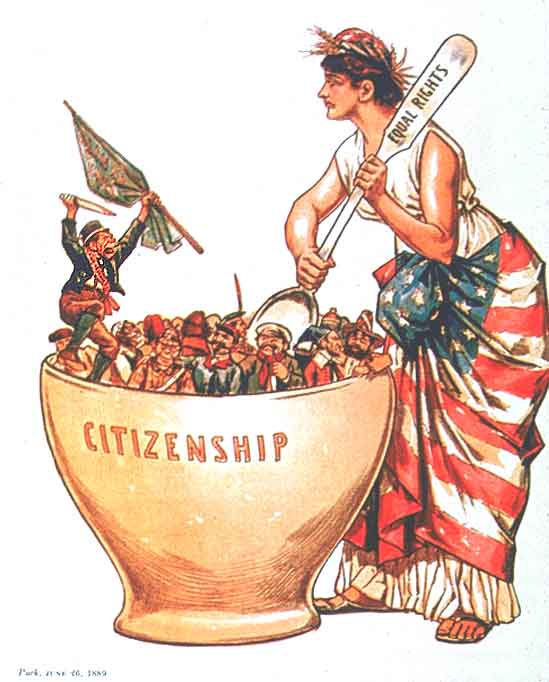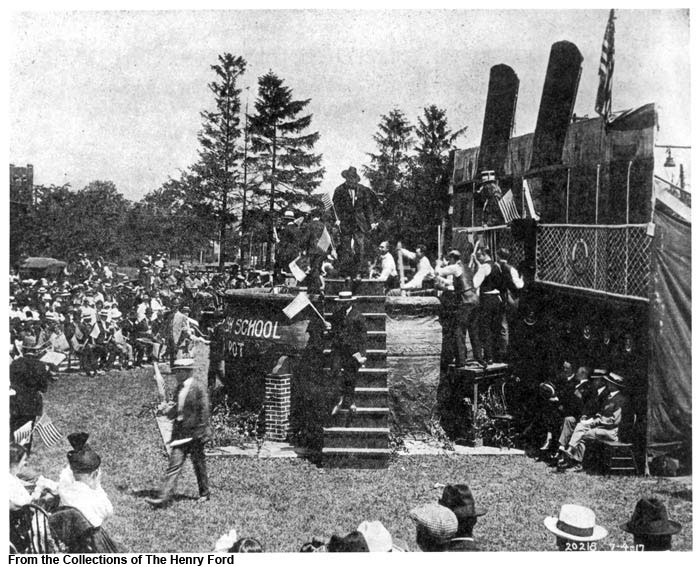General Discussion
Related: Editorials & Other Articles, Issue Forums, Alliance Forums, Region ForumsNational Mythology: The Melting Pot
There are a number of mythologies that people don't seem to understand for the myths they are, but here I will address one: The melting pot. It was never a cultural ideal. It was instead a cultural mechanism to induce immigrants to assimilate into Anglo-American cultural norms. Henry Ford used to stage plays at his factory: immigrants walked onto the stage in immigrant garb, entered the melting pot and emerged dressed as "Americans"--adopting the dress and mannerisms of Anglo-American culture and thereby signaling they knew how to be American.
Not everyone was, of course, capable of melting. Nineteenth-century images of the melting pot often portrayed an Irishman on the edge, refusing to melt.

Then there was the fact that African Americans, Hispanic Americans, Tribal Peoples, and Asian Americans were kept out of the pot.
Some seem to think Civil Rights meant everyone was supposed to melt, to become like the dominant culture. Following the Civil Rights movements of the 60s, a new metaphor emerged to describe America, the mixed salad bowl. Americans come from a wide array of cultural backgrounds. While part of the same country, we are not all the same ethnically, racially, or culturally. The salad bowl was meant to convey the idea that people could be part of a common nation without having to assimilate, to become like Anglo-Americans, in order to be productive members of society. They could speak native languages and engage in distinct cultural practices without being un-American. America was better off as a mixed salad because the various elements all contributed to the whole. They didn't have to erase their identities and "melt" in order to belong.
Now some here long fondly for the good old days when everyone was like them, didn't express cultural difference, and didn't talk about concerns about cultural appropriation. Those good old days were good for a select few, but not for most of us. They were good for the dominant culture, race, and gender, but not the majority of Americans. The good old days were an era of Jim Crow segregation. I do not long for those days. Being part of an inclusive society means that you are going to be exposed to ideas that make you uncomfortable. A diverse society means that people of color, of different immigrant or ethnic backgrounds, are going to talk about their experiences in ways that make many of you uncomfortable. To never be uncomfortable is to never learn. My plea is that you try to embrace that discomfort and learn something about the lives of others.
Journeyman
(15,042 posts)An early 20th Century social reformer and muckraking photojournalist, Riis was instrumental in publicizing the plight of newly arrived immigrants and the squalor and crime with which they had to contend. Befriended by Theodore Roosevelt, Riis proved indispensable in the movement to both integrate a wide array of peoples into their new society and to provide better housing and living conditions for all.
He rejected the "melting pot" analogy because it wasn't what he saw. In his experience, it was best described as a "crazy quilt of humanity," all stitched together but retaining its group and individual identification.
I see that as a much better description of us all. A crazy quilt. The patches may be smaller and less distinct, patterns and colors blending across the seams, but singularly distinct in the main, nonetheless.
I keep that idea foremost in mind, and constantly reflect that not every "patch" in our quilt is cut square or properly stitched. In fact, there are many patches that are cut irregularly along both the warp and weft, and they are rarely if ever securely attached to anything, let alone woven in among the rest of us.
Jacob A. Riis, How the Other Half Lives (New York: Charles Scribner's Sons, 1890), 21-27.
BainsBane
(53,075 posts)Thank you!
JustAnotherGen
(31,932 posts)BainsBane
(53,075 posts)just don't hold the fascination they once did. ![]()
JustAnotherGen
(31,932 posts)Or - people could be too worked up over Elvis, using the word "and", and admonishing people for pointing out that right wing people on Yahoo message boards are basement dwelling Cheeto eaters.
Igel
(35,362 posts)But ossified and suffering from something like the etymological fallacy: What was is what always must be. The original definition, its etymology, must be its current definition. There's enough truth to it to find evidence to support the idea. But that's just saying if you look hard to enough you can probably find enough evidence to reassure yourself that you've always been right.
The Irish did "melt." So did numerous other "unmeltables." And while the original idea was everybody would assimilate to AS culture (which is a nice myth, since by the time this gives AS culture it had already had a number of N. European and other influences so it was distinct from anything like a lineal descendent of AS culture). There were pockets of hold outs, but most of this "evidence" is long obsolete.
By the 1950s it was assumed that most ethnicities would melt, even as there were still perceived differences between ethnicities--but by then the children of most ethnic groups were distinguished by superficial differences and by class, there being a correlation between being "ethnic" and class status. This hung in there in some respects for a while, but class lines blurred and religious differences were de-emphasized. Even in the '70s it could be pointed out that Polish-Americans were radically underrepresented in Congress, and while that was completely true it wasn't perceived as any kind of a problem because to be Polish-American wasn't to be of a different sort from Anglo-American or Irish-American. There were no calls for "affirmative action" to ensure that there was a proper representation of Polish-Americans, Italian-Americans, Czech-Americans, German-Americans, etc., a tacit admission that these had "melted". It was the ideal a decade or two before, and hadn't yet faded from common thought. But it was challenged, and less believed in high ed than most other places.
By the late 1960s what had come to be the fetish du jour wasn't distinctions of ethnicity per se but of race, with a push to avoid assimilation and cultural convergence and to actively nurture differences and distinctions, even if some had to be hyped, origins revised a bit, and attempts made to manufacture differences. After all, the "melting pot" hadn't worked for the previous century, it was claimed, and there had been ethnic conflicts, etc., because the melting pot hadn't worked. Overlooked was that many of the ethnic divisions from the '20s and '30s had been resolved through assimilation and convergence, and that the new divisions were typically new--except for where Jim Crow (and to some extent Jews) hadn't melted. The resolution of old distinctions was overlooked as what had produced conflict was the new panacea. About the same time the idea of a melting pot requiring absolute assimilation to an AS idea started circulating more widely--the harshest, least applicable version of the "melting pot" view. It was a strawman, but one that people wanted to believe, just as the "ethnic quilt as a means to harmony" view, so dysfunctional for the previous 100 years, was suddenly completely functional.
Immigration policy had facilitated a kind of convergence and assimilation by fixing the goalposts. The stream of in-migration was relatively small, so the mix that was here could largely reach a kind of equilibrium. Immigration picked up again in the '60s, though, at the exact time that the AA push to avoid convergence and accentuate differences and distinctions happened. Justice also acquired an oddly communal nature, an accretion to common law.
It pays to note that AA English diverged from mainstream English under Jim Crow, but not very quickly. AA English's divergence from both "NBC" and "Southern English" accelerated from the end of segregation to the mid-00s, when I read some research on the matter based on diary entries and contemporaneous descriptions. (In other words, to project current "ebonics" back to 1850 is to exaggerate many of the differences. At the time AA varieties were very similar to regional Southern American English varieties. Part of this divergence is likely due to homogenization of AAVE after the great migration and introduction of both mass media and peer pressure to uphold something closer to a single in-group norm, but part involved building group boundaries. There's a fairly large literature that shows that if two groups (or if one group out of two) want to accentuate differences language change can happen fairly quickly to produce novel differences. This was well documented for some Central American villages and is currently being documented for the breakup of the Croatian-Serbian dialect continuum. You don't want to be like what you hate or find inferior.
JustAnotherGen
(31,932 posts)JAG out - you and BB can speak/write to this at a level that I hope people will take the time to read and understand.
HereSince1628
(36,063 posts)As such it is a concept that was adopted by nativists who wanted "America" to maintain the look it had in 1880. And yes, it was the diversity reported in the 1880 census that was actually used to set the early 20th century's immigration quotas for countries of origin.
You jumped in and you just had to come out coated with "Americana".
Perhaps nothing in America was so iconic of this process as the Ford English School graduation ceremony. In that ceremony immigrant workers successfully learning a bit of English and perhaps having established an offered savings plan to buy a Ford auto, dressed in folk costume entered the pot and came out transformed...dressed in American fashions waving an American flag.

BainsBane
(53,075 posts)Thanks for posting it.
YoungDemCA
(5,714 posts)Thank you for the insights, to BainsBane and all who participated.
Rec. ![]()